DOWNLOAD
ROUNDUP: AUGUST 2011/1
Brian Wilson
I’ve optimistically numbered this as
the first August 2011 Roundup but, for reasons which I explained
in the July/2
Roundup, it may be the only one this month. The July/1 Roundup
is here
and earlier Roundups may be found here.
I should point out that the URLs which I give for individual
downloads may be valid only in the UK. Some providers don’t
operate at all, say, in Australia, while most historical recordings
may not be available in the USA, where copyright last longer
than in the UK. Where I give URLs for amazon.co.uk, readers
in the US should automatically be offered to be redirected to
amazon.com.
Download
of the Month
English Spring
Arnold BAX (1883-1953) Spring
Fire (1913) [32:33]
Frederick DELIUS (1862-1934)
Idylle de Printemps (1889) [10:45]; North Country
Sketches: The March of Spring (1914) [10:08]
Frank BRIDGE (1879-1941)
Enter Spring (1927) [20:50]
The Hallé/Sir Mark Elder
rec. 18 March 2010, 14 October 2010, Bridgewater Hall, Manchester
(Bax; Idylle); 23-24 June 2010, BBC Studio 7, New Broadcasting
House, Manchester (March; Bridge). DDD
HALLE CDHLL 7528 [74:30] – from classicsonline.com
(mp3) or stream from Naxos Music Library
[Recording of the Month – see review
by Rob Barnett.]
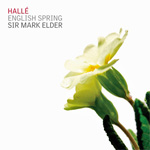 This
wasn’t available to download a couple of months ago, so
I recommended a good alternative for the Bax in the form of
an all-Bax Vernon Handley recording on Chandos (CHAN10155X:
see May
2011/2 Roundup). That’s still a strong recommendation
if you want an all-Bax programme, but the new recording casts
its net wider, with a more varied programme – not that I subscribe
to the view that all Bax’s music sounds alike: far from
it – and the performances are well deserving of the strong recommendations
from our own RB and elsewhere. The 320kb/s mp3 transfer does
justice to the recording.
This
wasn’t available to download a couple of months ago, so
I recommended a good alternative for the Bax in the form of
an all-Bax Vernon Handley recording on Chandos (CHAN10155X:
see May
2011/2 Roundup). That’s still a strong recommendation
if you want an all-Bax programme, but the new recording casts
its net wider, with a more varied programme – not that I subscribe
to the view that all Bax’s music sounds alike: far from
it – and the performances are well deserving of the strong recommendations
from our own RB and elsewhere. The 320kb/s mp3 transfer does
justice to the recording.
Freebie
of the Month
EMI and Virgin Classics Sampler 2011
Ludwig van BEETHOVEN (1770-1827)
Sonata No. 8 in c minor, Op. 13 ‘Grande Sonate pathétique’:
Adagio cantabile [5:53]
Ingrid Fliter (piano)
George Frideric HANDEL (1685-1759)
Ariodante HWV 33, Atto secondo, Scena 3: Aria:
Scherza infida [9:57]
Joyce DiDonato; Alan Curtis/Il Complesso Barocco
Johann Sebastian BACH (1685-1750)
Goldberg Variations, BWV988: Aria – Andante espressivo [5:22]
Nicholas Angelich (piano)
Ludwig van BEETHOVEN
String Quartet No.3 in D, Op.18 No.3: III. Allegro [2:50]
Artemis Quartet
Robert SCHUMANN (1810-1856)
Piano Trio No. 1 in d minor, Op.63: IV. Mit Feuer [7:52]
Leif Ove Andsnes (piano); Christian Tetzlaff (violin); Tanja
Tetzlaff (cello)
Johannes BRAHMS (1833-1897)
Ein deutsches Requiem (A German Requiem) Op.45: IV. Wie
lieblich sind deine Wohnungen (Mässig bewegt) [5:15]
Natalie Dessay; Ludovic Tézier; Swedish Radio Choir;
Frankfurt Radio Symphony Orchestra
Fryderyk CHOPIN (1810-1849)
Nocturne No. 2 in E flat, Op.9 [3:56]
Yundi (piano)
Edvard GRIEG (1843-1907) Violin
Sonata in F, Op.8: II – Allegretto quasi andantino [5:20]
Vilde Frang (violin); Michail Lifits (piano)
Free from amazon.co.uk
(mp3)
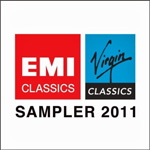 Just
about everything here is at or close to the top of its game,
so to have it all offered free is generosity indeed. There may,
however, be more than an element of enlightened self-interest
at play in that EMI and Amazon hope that you will purchase one
or more of the constituent albums. Be warned that you are very
likely to be tempted, especially as Amazon’s pricing policy
is generally keen – £4.49 for Ingrid Fliter’s accomplished,
if slightly understated, Beethoven recording, for example, or
£11.49 for the 3-CD set of Ariodante. Oddly, while
the Beethoven comes complete with booklet, the Handel, where
it is more important, doesn’t.
Just
about everything here is at or close to the top of its game,
so to have it all offered free is generosity indeed. There may,
however, be more than an element of enlightened self-interest
at play in that EMI and Amazon hope that you will purchase one
or more of the constituent albums. Be warned that you are very
likely to be tempted, especially as Amazon’s pricing policy
is generally keen – £4.49 for Ingrid Fliter’s accomplished,
if slightly understated, Beethoven recording, for example, or
£11.49 for the 3-CD set of Ariodante. Oddly, while
the Beethoven comes complete with booklet, the Handel, where
it is more important, doesn’t.
At the time of writing, Amazon appeared to be experiencing problems
with downloads: I had to try three times to download the sampler
and their comments page was full of similar complaints. It looks
as if they have overcome the problem now, but be sure to contact
them if you have similar problems – they very quickly and courteously
refunded the cost of an album which I had paid for and which
refused to download.
Please
buy me …
Robert SIMPSON (1921-1997)
Symphony No 1 (1951) [28:41]
Symphony No 8 (1981) [44:00]
Royal Philharmonic Orchestra/Vernon Handley – rec. 1996. DDD.
Pdf booklet included.
HYPERION CDA66890 [73:01] – from hyperion-records.co.uk
(mp3 and lossless)
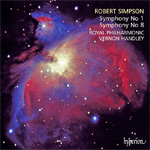 This
is another recording from Hyperion’s series of Robert Simpson’s
symphonies which has fallen into neglect and is offered at the
time of writing at half price. Perhaps the neglect is due to
Simpson’s reputation as a ‘difficult’ composer which is not
entirely warranted: if I can respond, when I’m no lover of the
avant-garde, so could most listeners. It won’t still be at half
price when you read this, but the download is inexpensive enough
for you to give it a try. The lossless version is excellent
as, I’m sure from experience, the mp3 will be too. I noted just
a couple of brief glitches at track changes between sections
of movements when played via Squeezebox and when burned to CD.
This
is another recording from Hyperion’s series of Robert Simpson’s
symphonies which has fallen into neglect and is offered at the
time of writing at half price. Perhaps the neglect is due to
Simpson’s reputation as a ‘difficult’ composer which is not
entirely warranted: if I can respond, when I’m no lover of the
avant-garde, so could most listeners. It won’t still be at half
price when you read this, but the download is inexpensive enough
for you to give it a try. The lossless version is excellent
as, I’m sure from experience, the mp3 will be too. I noted just
a couple of brief glitches at track changes between sections
of movements when played via Squeezebox and when burned to CD.
I recommended the coupling of Nos. 3 and 5 (CDA66728),
an even better place to start to get to know these symphonies,
in my February
2010 Roundup, when that, too, was briefly relegated to the
Please Buy Me category.
Beulah August
Highlights
Beulah Extra have some very tasty reissues this month. Chief
among them are:
Fryderyk CHOPIN (1810-1849)
Nocturnes Nos.1-10
Peter Katin (piano) – rec. May 1955. ADD/mono.
BEULAH EXTRA 1BX155-10BX55 [4:58 + 4:11 + 5:35 + 3:48
+ 3:35 + 5:00 + 4:35 + 5:11 + 4:28 + 5:00] – from eavb.co.uk
(mp3)
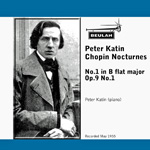 I
can only echo the verdict when these recordings first appeared
in the UK, that Katin’s performances are very successful: even
now they remain competitive. With a recording which still sounds
very well in Beulah’s transfer, the only (minor) complaint is
that the set is not complete. Though they are available separately,
most buyers will surely wish to have all ten Nocturnes together.
I
can only echo the verdict when these recordings first appeared
in the UK, that Katin’s performances are very successful: even
now they remain competitive. With a recording which still sounds
very well in Beulah’s transfer, the only (minor) complaint is
that the set is not complete. Though they are available separately,
most buyers will surely wish to have all ten Nocturnes together.
Carl NIELSEN (1865-1931)
Symphony No.4, Op.29 (Inextinguishable) (1916)
Danish National Radio Symphony Orchestra/Thomas Jensen – rec.
1951. ADD/mono
BEULAH EXTRA 1BX161 [33:15] – from eavb.co.uk
(mp3)
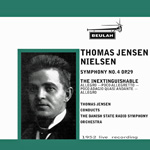 Thomas
Jensen was an authoritative conductor of Nielsen’s music
and his recording of the ‘Inextinguishable’ Symphony
may have been equalled but it has never been bettered. The music
was novel enough in 1951 for it to be necessary for Lionel Salter
to explain its nature and the point of its title and to stress
its position as an important work. None of that is necessary
now, except for those unfamiliar with Nielsen’s music – and they would do better to start with a modern recording, such
as Blomstedt’s inexpensive Double Decca set of Symphonies
Nos.4-6, the Little Suite and Hymnus Amoris (460 9882 – see review
by Rob Barnett of an earlier incarnation on a 3-CD set). That
recording comes as an mp3 download from passionato.com,
though, at £12.99, you may find that it’s more expensive
than many dealers charge for the CDs.
Thomas
Jensen was an authoritative conductor of Nielsen’s music
and his recording of the ‘Inextinguishable’ Symphony
may have been equalled but it has never been bettered. The music
was novel enough in 1951 for it to be necessary for Lionel Salter
to explain its nature and the point of its title and to stress
its position as an important work. None of that is necessary
now, except for those unfamiliar with Nielsen’s music – and they would do better to start with a modern recording, such
as Blomstedt’s inexpensive Double Decca set of Symphonies
Nos.4-6, the Little Suite and Hymnus Amoris (460 9882 – see review
by Rob Barnett of an earlier incarnation on a 3-CD set). That
recording comes as an mp3 download from passionato.com,
though, at £12.99, you may find that it’s more expensive
than many dealers charge for the CDs.
In 1952 the recording was criticised as far from good, with
starved string tone and fuzzy fortes and deterioration towards
side-ends – the latter a problem with LP cutting deficiencies
long after the 1950s. Dutton issued the performance on CD in
1996 in a much improved transfer, coupled with the Second Symphony,
but that recording seems to have disappeared, leaving only a
complete set of all six symphonies in alternative recordings
from Tuxen and Jensen on Danacord DAOCD351-3 (see review).
The Beulah transfer leaves the recording sounding limited by
modern standards but remarkable for its age with minimal surface
noise and a decent tonal range which in no way interfered with
my enjoyment. The fact that the symphony comes complete on one
track means that there are none of the short breaks between
tracks which usually occur with mp3 where the music is continuous.
Wolfgang Amadeus MOZART (1756-1791)
1BX154 Don Giovanni: Nur ihrem Frieden weih’ ich mein
Leben [4:00] – rec. 1960. ADD/stereo*
2BX154 Così fan tutte: Der Odem der Liebe [4:26] – rec. 1960 ADD/stereo**
3BX154 Die Entführung aus dem Serial: Konstanze
dich wieder zu sehen [5:16] – rec. 1960 ADD/stereo**
4BX154 Die Zauberflöte: Dies Bildnis ist bezaubernd
schön [4:10] – rec. 1960 ADD/stereo.
Friedrich von FLOTOW (1812-1833)
5BX154 Martha: Wie das schnattert, wie das plappert
[5:16]; 6BX154 Ach so fromm, ach so traut [2:51] – rec. 1960 ADD/stereo.**
7BX154 Albert LORTZING (1801-1851)
Zar und Zimmerman: Lebe wohl mein flandrish Mädchen
[4:49] – rec. 1959. ADD/stereo**
8BX154 Richard WAGNER (1813-1883)
Der fliegende Holländer: Mit Gewitter und Sturm
[3:33] – rec. 1960. ADD/stereo***
Johann STRAUSS II (1825-1899)
9BX154 Eine Nacht in Venedig: Annina! Caramello! [3:18];
10BX154 Ach, wie so herrlich zu schau’n [3:47] – rec. 1960. ADD/stereo^
11BX154 Carl Joseph MILLÖCKER
(1842-1899) Der Bettelstudent: Durch diesen Kuss
[4:05] – rec. 1959. ADD/stereo^^
Fritz Wunderlich (tenor); Liselotte Schmidt (soprano)^^; Berlin
Symphony Orchestra/Hans Zanotelli*; Berlin Symphony Orchestra/Berislav
Klobucar**; Berlin Staatsoper Orchestra/Franz Konwitschny***;
Berlin Symphony Orchestra/Fried Walter^; Berlin Symphony Orchestra/Werner
Schmidt-Boelcke^^
BEULAH EXTRA 1-11BX154 [timings as above] – from eavb.co.uk
(mp3)
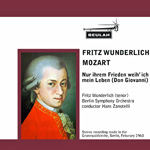 This
had to appear among my choices from this month’s Beulah downloads
if only because Fritz Wunderlich provided my introduction to
Mozart’s operas – to arias from them, at any rate. As was the
practice then, he sings even the arias from the da Ponte operas
in German, which is why La ci darem la mano will always
be Reich mir die Hand, mein Leben for me.
This
had to appear among my choices from this month’s Beulah downloads
if only because Fritz Wunderlich provided my introduction to
Mozart’s operas – to arias from them, at any rate. As was the
practice then, he sings even the arias from the da Ponte operas
in German, which is why La ci darem la mano will always
be Reich mir die Hand, mein Leben for me.
Wunderlich has some claim to be regarded as one of the greatest
tenors of all time – indeed he was recently voted the
greatest by the readers of a music magazine – and these recordings
demonstrate why. He even manages to make the wimpish Don Ottavio
sound positive in the excerpt from Don Giovanni.
There’s a wide range of material here – Wunderlich
was as much at home in operetta as in oratorio and opera –
and not everyone will want the whole bundle, which is why it’s
so useful to be able to select. I have to be in the right mood
to be receptive to operetta, but I can take it at any time as
sung by Wunderlich. On the other hand he confirms my belief
that Mozart and Wagner are the two greatest opera composers.
Fortunately Wunderlich lived long enough to be recorded in decent
sound and Beulah’s transfers are excellent. Only a slightly
tubby bass gives the age away.
Other Beulah Extra releases this month include some of Albert
Schweitzer’s recordings of J.S. BACH
organ works: the Prelude and fugue in e minor, BWV548,
known as ‘the Wedge’ (8BX60), and the choral preludes
BWV622: O Mensch bewein (10BX60), 625: Christ
lag in Todesbanden (11BX60), 626: Jesus Christus,
unser Heiland (9BX60) and 633: Liebster Jesu,
wir sind hier (12BX60), all recorded in 1936, but
still sounding very well in these Beulah transfers, with just
an occasional unavoidable plop. Playing styles may have moved
on since Schweitzer was hailed as indisputably one of the greatest
men alive, and even then his playing was thought to be ponderous,
but these valuable historical documents were well worth reissuing.
Earlier releases on Beulah Extra have included Schweitzer recordings
of Bach from 1935 on 3-5BX60 – from eavb.co.uk.
The incomparable horn player Dennis Brain features with Denis
Matthews (piano) in the BEETHOVEN
Horn Sonata, Op.17 (5BX84). The recording dates from
1950 – decent sound from a soundtrack recording, but rather
muffled by comparison with what was being achieved only four
or five years later. I haven’t heard the same performers’ 1944
recording, but I can’t imagine that it sounds much worse – could
it be that the soundtrack was derived from that 78 version,
as the odd patch of surface noise suggests? Nevertheless, the
sound didn’t spoil my enjoyment of the first-rate performance
of this light-weight piece.
Dennis Brain also features with Gerald Moore (piano) in the
DUKAS Vilanelle
on 4BX84, a recording from 1952. It’s an attractive
little bonne bouche, well played and decently recorded.
The BRAHMS Horn Trio in
E flat, Op.40, on 1-4BX152 takes us back to 1933 and
Dennis Brain’s father, Aubrey, with Adolf Busch (violin)
and Rudolf Serkin (piano); the original reviewer couldn’t
muster much enthusiasm for the work, which does have its longueurs,
but praised the performance and recording in the strongest terms – ‘worth getting for the sheer joy of the horn tone alone’.
The performance remains well worth hearing and the recording
is remarkably good for its age, its limitations merely making
it sound mellow.
Harry Mortimer conducts the massed brass bands of Foden Motors,
Fairey Aviation and Morris Motors in Edward
GERMAN, a selection from Merrie England (4BX156);
Jeremiah CLARKE Trumpet
Voluntary (3BX156); MEYERBEER
Coronation March from le Prophète (2BX156)
and Johann STRAUSS II Perpetuum
Mobile, Op.257 (1BX156). The recordings, in stereo,
date from 1959 and 1960. These are enjoyable performances and
the recordings still sound well.
The same four works also feature on 1PD56 [73:13] – entitled
simply Bandstand Music – alongside recordings
by the Band of the Grenadier Guards/F.J. Harris in the likes
of Blaydon Races, Lincolnshire Poacher, On Ilkley Moor and
Sussex by the Sea. The outstanding work is Eric
COATES Calling all Workers, used as the theme
tune for the BBC Light Programme’s Workers’ Playtime.
In addition to the four pieces above, Mortimer conducts Donkey
Serenade, Trombones to the Fore and several other pieces.
An enjoyable album, due to be available from iTunes in August.
There are two TCHAIKOVSKY
recordings: on 1BX153 Sena Jurinac with the Philharmonia
Orchestra/Lawrance Collingwood sings ‘Farewell you native hills
and fields’ (in German) from Act 1 of The Maid of Orleans
(rec. 1950) and on 3BX99 Erik Tuxen conducts the
Danish National Radio Orchestra in the Marche Slave,
Op.31 (rec. 1954).
This is perhaps not one of Jurinac’s most memorable recordings – perhaps that’s why it wasn’t released on LP at the time – but I was pleased to be reminded of the quality of her low-soprano
voice. She’s ably supported and the recording is more than acceptable – better than most recordings from 1950.
The Marche Slave dates from a time when the recording
companies had got the hang of reproduction of taped sound on
LP and still sounds well, though in mono. The performance is
excellent – as even Trevor Harvey, who didn’t much like
the work, was forced to admit in 1954. With Tuxen’s Liszt
Hungarian Rhapsody No.4 already available on 1BX99, we now have
the complete contents of the original 10" LP, as requested
when I recommended the Liszt in my December
2010 Roundup.
Eduard van Beinum’s 78 rpm recording of MENDELSSOHN’s
Overture The Hebrides (Fingal’s Cave), with
the LPO in 1949, resurfaces on 10BX37. It’s a stylish
performance, capturing the magic of the music, and the recording
sounds very well for its age, with just an occasional trace
of surface noise and a touch of strain in the sound of the high
strings.
Beulah have followed their Peter Dawson album (Peter Dawson
in Classical Mood, 1PD53 – see July 2011/1 Roundup) with
a second entitled Peter Dawson: Man of Song, due
to appear on iTunes in August 2011. (2PD53 [75:11]).
The contents, which were mainly recorded in the 78 rpm era,
open with two works by Elgar: Speak Music (with Gerald
Moore) and ‘But Rome and all her legions’ from Caractacus,
and include Jerusalem (with Lawrance Collingwood). Figaro’s
admonition to Cherubino (sung in English: ‘Now your days
of philandering are over’) might well have appeared on
the Classical album, but most of the music is of a somewhat
sentimental nature: the likes of The Miner’s Dream of
Home, The Road to Mandalay, The Cry of thae Wild Goose and
That Lucky old Sun and, inevitably for an Australian
singer, Waltzing Matilda. Like Fritz Wunderlich, Dawson’s
fine singing makes even the less accomplished music sound well.
Though only Albert Arlen’s Clancy of the Overflow
was recorded in stereo (1955) and some of the recordings date
from as early as 1920, Beulah’s transfer makes the most
of the sound.
***
Francisco JAVIER: La Ruta de Oriente (The Route to
the Orient)
Music and readings associated with the life of St Francis Xavier
Montserrat Figueras (soprano); Hespèrion XXI, La Capella
Reial de Catalunya/Jordi Savall – rec. 2006 and 2007. DDD.
ALIA VOX AVSA9856A+B [2 CDs: 2:34:15] – from passionato.com
(mp3)
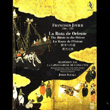 This
wonderful recording contains music from Europe and Asia from
the time of the life and travels of St Francis Xavier. CD 1
is entitled Europe in the Age of Humanism, CD2 deals
with his missionary work in Japan and China. At the time of
its release it earned widespread praise, though we seem to have
missed it here: better late than never.
This
wonderful recording contains music from Europe and Asia from
the time of the life and travels of St Francis Xavier. CD 1
is entitled Europe in the Age of Humanism, CD2 deals
with his missionary work in Japan and China. At the time of
its release it earned widespread praise, though we seem to have
missed it here: better late than never.
All the music is enthralling, such as the cross-cultural Raga
on O gloriosa Domina – there are far too many delights
to list – and the performances are all that we expect of Jordi
Savall: scholarly and historically informed, with just a touch
of hype to appeal to modern listeners. The mp3 recording is
good.
The only thing that would be preferable to the download would
be the luxury presentation of the SACDs in a multi-lingual hard-back
book. That, however, seems already to have been deleted in the
UK, though it remains available direct from Alia
Vox for €36.
Giovanni Pierluigi da PALESTRINA (c.1525/5-1594)
Choral Music 1 – Music for the Assumption of the BVM
Salve Regina a 8 [6:22]
Assumpta est Maria a 6 [6:23]
Masses, Book 14: Missa Assumpta est Maria [26:57]
Ave Regina cœlorum [4:29]
Motets for 5-8 Voices: Book 4 for 5 Voices, ‘Canticum
canticorum’ (excerpts): Tota pulchra es [2:28];
Vulnerasti cor meum [3:10]; Sicut lilium inter spinas
[3:49]
Offertoria totius anni (excerpts): Diffusa est gratia
[3:35]
Assumpta est Maria a 5 [2:24]
Motets for 5-8 Voices: Book 3 for 5, 6 and 8 Voices: Ave
Maria a 5 [4:27]
The Sixteen/Harry Christophers
Pdf booklet with texts and translations included.
CORO COR16091 [64:10] – from classicsonline.com
(mp3) or stream from Naxos
Music Library
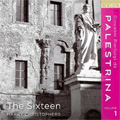 This,
the first recording in a planned series of Palestrina’s
choral music is practically self-recommending. I modify my otherwise
complete recommendation because of the existence of some excellent
rival recordings: there’s an almost identical programme
from the Tallis Scholars on CDGIM204, available for downloading
in lossless sound as well as mp3. Good as the classicsonline
download is – very good, indeed – Gimell’s lossless version
is even better. Moreover, the Gimell is offered as a two-for-one
set, with the Missa Papæ Marcelli, Lamentations
for Holy Saturday and Missa brevis included: see the
January
2009 Download Roundup and Tallis
Scholars at 30.
This,
the first recording in a planned series of Palestrina’s
choral music is practically self-recommending. I modify my otherwise
complete recommendation because of the existence of some excellent
rival recordings: there’s an almost identical programme
from the Tallis Scholars on CDGIM204, available for downloading
in lossless sound as well as mp3. Good as the classicsonline
download is – very good, indeed – Gimell’s lossless version
is even better. Moreover, the Gimell is offered as a two-for-one
set, with the Missa Papæ Marcelli, Lamentations
for Holy Saturday and Missa brevis included: see the
January
2009 Download Roundup and Tallis
Scholars at 30.
Predictably, Harry Christophers moves The Sixteen along slightly
more briskly overall in the Mass than does Peter Phillips his
Scholars, but the difference is not very marked and, as usual,
I find it almost impossible to choose between two such excellent
interpretations – both probably much better than Palestrina
ever heard. If you wish to do the comparison yourself, both
can be streamed from the Naxos Music Library, where you’ll
find the earlier single-CD issue from the Tallis Scholars on
Gimell CDGIM020.
Those in search of a bargain but not wishing to obtain the 2-for-1
Gimell, will find a splendid answer to their requirements on
Musical Concepts Alto MCS-ED-9022, where the Missa
Assumpta est Maria is coupled with the Missa Papæ
Marcelli by the Pro Cantione Antiqua and Mark Brown – from
classicsonline.com
in mp3 for £4.99 or stream from Naxos
Music Library.
The Gimell recording doesn’t offer any excerpts from the
Canticum Canticorum (Song of Songs), but you’ll
find a review of a complete recording of that work from Magnificat
on Linn CKD174 reviewed in the October
2009 Roundup.
Johann Sebastian BACH (1685-1750)
Overture (Suite) No.3 in D, BWV1068 (1731) [20:43]
Concerto in f minor for solo harpsichord and strings, BWV1056
(1742) [9:06]
Brandenburg Concerto No.6 in B flat, BWV1051 (1721) [15:50]
Concerto in d minor for three harpsichords, BWV1063 (1731) [12:44]
Café Zimmermann/Céline Frisch (harpsichord) – rec. February 2004, March and May 2010. DDD
Pdf booklet included.
ALPHA 168 [58:31] – from classicsonline.com
(mp3) or stream from Naxos Music Library
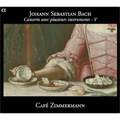 This
is billed as Volume 5 of Alpha’s Concerts avec plusieurs
instruments, though only BWV1063 fits that description.
Everything here is available in a score of rival recordings,
many of them excellent and most of them much more logically
coupled – significantly, this album combines three recording
sessions, six years apart – but that’s my only significant
reservation. The dainty domestic scene on the cover might seem
wrongly to imply that Bach’s music is fussy and delicate,
but that’s a much more minor reservation.
This
is billed as Volume 5 of Alpha’s Concerts avec plusieurs
instruments, though only BWV1063 fits that description.
Everything here is available in a score of rival recordings,
many of them excellent and most of them much more logically
coupled – significantly, this album combines three recording
sessions, six years apart – but that’s my only significant
reservation. The dainty domestic scene on the cover might seem
wrongly to imply that Bach’s music is fussy and delicate,
but that’s a much more minor reservation.
Put those reservations aside, as I soon did, and everything
here is well-nigh ideal: small-scale performances which nevertheless
convey all the power of the music, well recorded and available
in mp3 sound which does the recording justice. Now how did I
miss the four earlier volumes in this series?
Johann Wilhelm HERTEL (1727-1789)
Con spirito
Bassoon Concerto in a minor [17:58]
Sinfonia in D [7:06]
Bassoon Concerto in B [14:56]
Sinfonia in G [7:29]
Bassoon Concerto in E flat [22:41]
Sinfonia in B flat [10:43]
Sergio Azzolini (bassoon); Capriccio Basel Baroque Orchestra/Dominik
Kiefer
Pdf booklet included.
TUDOR 7182 [80:53] – from classicsonline.com
(mp3) or stream from Naxos
Music Library
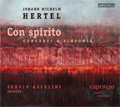 You
might easily pass over this recording: don’t. I hadn’t
even heard of Johann Wilhelm Hertel – even his better-known
father is not exactly a household name – but I greatly enjoyed
this recording of his bassoon concertos and sinfonias. The programme
is stylishly and engagingly performed and well recorded and
the mp3 transfer is good, apart from a strange noise like a
stifled cough which appears very briefly at the start of each
work in the Naxos Music Library version. The programme is a
few seconds too long to burn to a CDR.
You
might easily pass over this recording: don’t. I hadn’t
even heard of Johann Wilhelm Hertel – even his better-known
father is not exactly a household name – but I greatly enjoyed
this recording of his bassoon concertos and sinfonias. The programme
is stylishly and engagingly performed and well recorded and
the mp3 transfer is good, apart from a strange noise like a
stifled cough which appears very briefly at the start of each
work in the Naxos Music Library version. The programme is a
few seconds too long to burn to a CDR.
Muzio CLEMENTI (1752-1832)
The Complete Sonatas -Vol. 5
Sonata in C, Op. 34, No. 1 [18:31]
Sonata in g minor, Op. 34, No. 2 (1795) [21:57]
Six Progressive Sonatinas, Op. 36 (1797) [37:01]
Sonata in C, Op. 37, No. 1 [15:27]
Sonata in G, Op. 37, No. 2 [13:10]
Sonata in D, Op. 37, No. 3 [14:29]
Sonata in B flat, Op. 46 (1820) [25:43]
Howard Shelley (piano) – rec. October 2009. DDD
Pdf booklet included
HYPERION CDA67814 [2 CDs for the price of one: 77:51
+ 67:28] – from hyperion-records.co.uk
(mp3 and lossless)
[Recording of the Month. ‘The music on this
generous almost two and a half hours of immaculate playing by
Shelley, who must now be considered Clementi’s ‘reference’
pianist, makes a persuasive case for those as yet unfamiliar
with the repertoire to look into it more closely.’ – see
full review
by Mark Sealey.]
The Complete Sonatas – 6
Sonata in G, Op 40 No 1 (1802) [25:03]
Sonata in b minor, Op 40 No 2 [16:04]
Sonata in D, Op 40 No 3 [19:17]
Sonata in A, Op 50 No 1 (1821) [21:16]
Sonata in d minor, Op 50 No 2 [19:15]
Sonata in g minor, Op 50 No 3 [25:40]
Howard Shelley (piano) – rec. December 2009. DDD.
Pdf booklet included
HYPERION CDA67819 [2 CDs for the price of one: 60:26
+ 66:13] – from hyperion-records.co.uk
(mp3 and lossless)
Muzio CLEMENTI
Piano Sonata in D, Op 40 No 3 (1802) [19:42]
Piano Sonata in f sharp minor Op 25 No 5 (Op.26/2) (1790) [18:05]
Piano Sonata in B flat, Op 24 No 2 (Op.41/2, Op.47/2) (1781)
[12:27]
Piano Sonata in b minor Op 40 No 2 (1802) [17:59]
Nikolai Demidenko (piano) – rec. December 1994. DDD.
Pdf booklet included
HYPERION HELIOS CDH55227 [68:42] – from hyperion-records.co.uk
(mp3 and lossless)
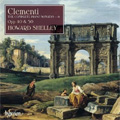
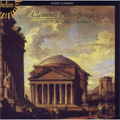 We’ve
followed the series of recordings by Howard Shelley as it has
progressed – as you see, Volume 5 was MS’s Recording
of the Month – but we seem to have missed Volume 6 and
the Nikolai Demidenko selection. Rest assured that Volume 6
maintains the high quality of the earlier releases and, like
them, with two CDs offered for the price of one, it’s excellent
value: minute for minute, it’s even less expensive than
the budget-price Demindenko.
We’ve
followed the series of recordings by Howard Shelley as it has
progressed – as you see, Volume 5 was MS’s Recording
of the Month – but we seem to have missed Volume 6 and
the Nikolai Demidenko selection. Rest assured that Volume 6
maintains the high quality of the earlier releases and, like
them, with two CDs offered for the price of one, it’s excellent
value: minute for minute, it’s even less expensive than
the budget-price Demindenko.
I’ve also been listening recently to two 3-CD sets of Clementi’s
keyboard music on Brilliant Classics, performed on fortepianos
from around 1800 by Costantino Mastroprimiano. (Volume 4, Brilliant
94024 and Volume 5, Brilliant 94113). Expect a two-handed review
shortly of these Briliant boxes from myself and Geoff Molyneux.
Collectively these recordings have made me aware that the music,
especially the later works on these recordings, is far more
interesting and varied than I had thought, though no match,
of course, for that of his great contemporary Beethoven. Listen
to the extracts from Op.34/2 on the Hyperion website for a good
example.
For all the considerable interest of hearing the period performances
on the Brilliant boxes and the dexterity of Mastroprimiano’s
playing, Shelley, excellently recorded on a modern instrument,
would be my first choice and I look forward to the final volume
of capriccios and variations, due for release in September 2011.
Those not looking for completeness will find the Demidenko selection
more to their purpose, with an attractive selection from the
works of different periods in Clementi’s development, well
recorded and at an appealing price. Where the two performers
overlap, as in Op.40/3, Demidenko makes the music sound just
a little more romantic.
Franz SCHUBERT (1797-1828)
String Quartet No. 14 in d minor, D810, Death and the Maiden
(1824) [43:20]
Robert SCHUMANN (1810-1856)
Piano Quintet in E flat, Op. 44 (1843) [30:52]
Sviatoslav Richter (piano); Borodin Quartet – rec. October 1995
and June 1994. DDD
WARNER APEX 2564 67429-8 [74:12]
Earlier release on Warner Elatus available to download from
amazon.co.uk
(mp3).
[‘Richter and the Borodin Quartet’s
performance of the Schumann Piano Quintet would justify purchasing
this disc by itself, particularly at bargain price, and you
get a pretty good “Death and the Maiden” as a bonus.’ See
review
by Guy Aron.]
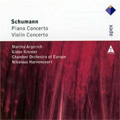 The
latest release on the budget Apex label seems not yet to be
available as a download, except via the Play MPE Player, which
is mainly intended for reviewers, but Amazon.co.uk have the
earlier mid-price Elatus reissue for just £4.99, which
makes it (just) competitive with the Apex CD. At that price
these excellent performances are a real bargain.
The
latest release on the budget Apex label seems not yet to be
available as a download, except via the Play MPE Player, which
is mainly intended for reviewers, but Amazon.co.uk have the
earlier mid-price Elatus reissue for just £4.99, which
makes it (just) competitive with the Apex CD. At that price
these excellent performances are a real bargain.
Don’t forget the excellent performance of Death and
the Maiden and its predecessor, D804, the Rosamunde
Quartet, by the Takács Quartet on Hyperion (CDA67585
– see December
2009 Roundup and review
by Tim Perry).
Jean SIBELIUS (1865-1957)
String Quartet in d minor: Voces intimae, Op.56 (1909)
[31:01]
Bedřich
SMETANA (1824-1884)
String Quartet No 1 in e minor: Z mého života
(‘From my life’) (1876) [28:01]
String Quartet No 2 in d minor (1882/3) [18:05]
Dante Quartet (Krysia Osostowicz (violin); Giles Francis (violin);
Judith Busbridge (viola); Bernard Gregor-Smith (cello)) –
rec. July 2010. DDD.
Pdf booklet included
HYPERION CDA67845 [77:56] – from hyperion-records.co.uk
(mp3 and lossless)
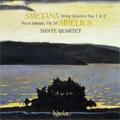 Many
recordings of the two Smetana Quartets offer no coupling, so
this is a very generously filled and varied album. In that respect
it’s equalled only by the recent inexpensive Alto reissue
of the Talich Quartet recording which adds Janáček’s First
Quartet and Suk’s Meditations to the two Smetana
works (ALC1079: see review
by Jonathan Woolf – ‘highly satisfying’. Download
in mp3 from classicsonline.com.)
Many
recordings of the two Smetana Quartets offer no coupling, so
this is a very generously filled and varied album. In that respect
it’s equalled only by the recent inexpensive Alto reissue
of the Talich Quartet recording which adds Janáček’s First
Quartet and Suk’s Meditations to the two Smetana
works (ALC1079: see review
by Jonathan Woolf – ‘highly satisfying’. Download
in mp3 from classicsonline.com.)
I haven’t heard that Alto version but I can’t imagine
that the performances outshine those of the Dante Quartet –
and the Hyperion download is not much more expensive than the
Alto CD or download. Smetana’s better-known autobiographical
First Quartet opens with all the power that it needs, but the
Dante Quartet also capture the wistful tenderness and, later,
the sheer exuberance which this work contains. I wondered if
there was enough power in that dreadful sustained note which
shatters the joyfulness of the finale, signifying the onset
in 1874 of the tinnitus and subsequent deafness which were to
ruin the rest of his life. Perhaps it’s just that the effect
is so startling the first time that one hears it that no subsequent
performance can quite repeat the shock.
The recording and transfer are excellent, especially in lossless
format. I don’t burn many downloads to CDR because I have
too many CDs to house them all properly and normally play everything
via Squeezebox, but I tried burning the lossless version of
this from the free version of Winamp and was delighted with
the results: if anything, the CDR sounded slightly better than
from Squeezebox.
Havergal BRIAN (1876-1972)
Fantastic Variations on an Old Rhyme (1907) [11:58]
Symphony No. 20 in c sharp minor (1962) [26:29]
Symphony No. 25 in a minor (1966) [24:18]
National Symphony Orchestra of Ukraine/Andrew Penny
(Previously released on Marco Polo 8.223731)
Recorded in association with the Havergal Brian Society (www.havergalbrian.org)
and
The Rex Foundation at the Concert Hall of Ukrainian Radio, 28-30
October 1994. DDD
Pdf booklet included.
NAXOS 8.572641 [62:41] – from classicsonline.com
(mp3) or stream from Naxos Music Library
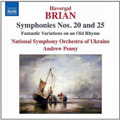 The
performance of Havergal Brian’s Gothic Symphony
at the BBC Proms on 17 July 2011 should, I hope, have stirred
renewed interest in his music, in which case Naxos and classicsonline.com
are ready and able to step into the breach with a number of
pioneering recordings originally released on their Marco Polo
label. This recording of Symphonies Nos. 20 and 25 is the latest
to be reissued less expensively. Nos. 11 and 15 on Naxos were
reviewed in the August
2010 Roundup and Nos. 17 and 32 in the January
2011 Roundup.
The
performance of Havergal Brian’s Gothic Symphony
at the BBC Proms on 17 July 2011 should, I hope, have stirred
renewed interest in his music, in which case Naxos and classicsonline.com
are ready and able to step into the breach with a number of
pioneering recordings originally released on their Marco Polo
label. This recording of Symphonies Nos. 20 and 25 is the latest
to be reissued less expensively. Nos. 11 and 15 on Naxos were
reviewed in the August
2010 Roundup and Nos. 17 and 32 in the January
2011 Roundup.
Most of those Marco Polo recordings were made with orchestras
from Eastern Europe, which might seem to have been a disadvantage
until one considers that Brian’s music was hardly well
known even to UK orchestras at the time – or even now –
and that Andrew Penny as conductor was the constant factor.
In the event, though the players sometimes sound a bit baffled
by the music, as one reviewer put it in 1996 – so, I understand,
did the BBC Symphony Orchestra and Sir Adrian Boult when they
performed the Gothic in 1966* – they rise very well
to the occasion.
The opening variations on Three Blind Mice are something
of a virtuoso tour de force and they come off least well, perhaps
because the orchestra were unfamiliar with the underlying ‘old
rhyme’. The two symphonies are not the easiest of nuts
to crack, but they will reward your perseverance and all concerned
make a strong case for them. The recording is more than acceptable:
I was going to say that a lossless issue might improve matters,
as offered by theclassicalshop.net – not yet available
for this recording at the time of writing – but I see that
the Marco Polo release was described as slightly raw at times.
For reviews of downloads of more music by Brian, see:
– Burlesque Variations, etc.: Toccata (March
2011/2 Roundup)
– Symphonies Nos.6 and 16 : Lyrita –
Fredman (+ Arnold COOKE
Symphony No.3) (November
2009 Roundup)
* issued on Testament SBT2 1454- see review.
For the Marco Polo/Naxos recording of the Gothic, see
reviews by Rob
Barnett and John France, and Paul
Serotsky.
Béla BARTÓK (1881-1945)
Piano Concerto No.1, Sz 83 [23:24]
Piano Concerto No.2, Sz 95 [28:28]
Piano Concerto No.3, Sz 119 [24:12]
András Schiff (piano); Budapest Festival Orchestra/Iván
Fischer – rec. 1996. DDD.
WARNER CLASSICS & JAZZ APEX 2564 67437-8 [76:28]
– on CD, or download earlier Elatus version from Amazon.co.uk
(mp3)
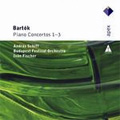 If
you heard András Schiff perform the Third Concerto at
the Proms, you may be looking for a recording of all three works.
If so, the Apex reissue, at budget price, will do very nicely.
On the mid-price Elatus label this was already a bargain, now
it’s a real snip. Be warned, however, that the other two
concertos are tougher, less easily approachable than the Indian
Summer Third – but well worth getting to know.
If
you heard András Schiff perform the Third Concerto at
the Proms, you may be looking for a recording of all three works.
If so, the Apex reissue, at budget price, will do very nicely.
On the mid-price Elatus label this was already a bargain, now
it’s a real snip. Be warned, however, that the other two
concertos are tougher, less easily approachable than the Indian
Summer Third – but well worth getting to know.
I streamed this recording from the Play MPE player – mainly
intended for reviewers to obtain access. Dealers still have
two earlier CD reissues on sale – make sure that you choose
the least expensive, the Apex as listed above. The Apex reissue
is not yet available to download in the UK but the Amazon download
of the Elatus version at £5.80 is (just) competitive with
the price of the Apex CD. The recording is excellent.
For an alternative version, see my review of the Bavouzet recording
on Chandos in the October
2010 Roundup (CHAN10610). I liked Bavouzet’s
First but the other two performances left me cold. My recommendation
of the Kovacevich recording on Decca Originals 475 8690, and
the Philips Duo download from passionato.com holds good alongside
the Schiff reissue.
Paul HINDEMITH (1895-1963)
Mathis der Maler (1934) [27:16]
Nobilissima Visione (1938) [22:46]
Symphonic Metamorphosis on Themes of Carl Maria von Weber
(1938) [21:28]
São Paulo Symphony Orchestra/John Neschling – rec.
August 2008, Sala São Paulo, Brazil. DDD
Pdf booklet included.
BIS-SACD-1730 [72:41] – from eclassical.com
(16- and 24-bit flac, mp3)
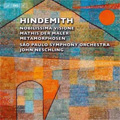 One
tends to think of Paul Hindemith a somewhat dour neo-classicist,
yet his opera Mathis der Maler and its symphonic predecessor
are both passionate and colourful. As for his collaboration
with choreographer Leonard Massine, it yielded an equally approachable
ballet based on the life of St Francis of Assisi; the ensuing
suite, titled Nobilissima Visione, may be less popular
but there’s much to enjoy there too. Ditto Hindemith’s
exotically scored work based on themes by Weber, fashioned from
a failed Massine project.
One
tends to think of Paul Hindemith a somewhat dour neo-classicist,
yet his opera Mathis der Maler and its symphonic predecessor
are both passionate and colourful. As for his collaboration
with choreographer Leonard Massine, it yielded an equally approachable
ballet based on the life of St Francis of Assisi; the ensuing
suite, titled Nobilissima Visione, may be less popular
but there’s much to enjoy there too. Ditto Hindemith’s
exotically scored work based on themes by Weber, fashioned from
a failed Massine project.
The Mathis and Weber pieces are well-served on
disc, Herbert Blomstedt’s San Francisco versions especially
memorable (Decca 421 5230 2, also available as an mp3 from Amazon;
see reviews of the composer’s
DG and Blomstedt
Decca boxed sets). On the subject of downloads, I hope to
review HDTT’s reissue of William Steinberg’s Mathis
some time soon. As for the ballet suite, I’ve long admired
Jean Martinon’s Chicago account, re-released in a very
good 24-bit/96kHz transfer as part of BMG’s ‘High
Performance’ series (09026 63315 2).
Conductor John Neschling has since departed from São
Paulo, leaving behind an impressive list of recordings for BIS.
I was less than happy with this band’s Chandos download
of works by Florent Schmitt under Yan Pascal Tortelier –
review
– so I hoped this Hindemith selection would capture some
of the synergy that made Neschling’s earlier recordings
so involving. As far as Mathis is concerned, it makes
a strong statement. BIS have gone for a big, bold sound that
suits this expansive piece very well. My only quibble –
and this relates to a number of recent BIS releases – is
that one needs to crank up the volume for the best sonic results.
No such problems with Blomstedt; indeed, his 1988 recording
confirms that even in the early days of digital Decca produced
discs of exceptional range and refinement.
The Brazilians certainly aren’t as limber as their American
counterparts, nor is Neschling as mercurial in that angelic
concert. Blomstedt also taps into the essential medievalism
of the piece more convincingly, notably in the dark-toned ‘Grablegung’.
Really, Blomstedt is more painterly at this and so many points;
he also builds dramatic tension – and scales those broad,
shattering climaxes – with greater imagination and flair.
For all its virtues the BIS Mathis seems a tad four-square
at times; just listen to the growing ecstasy of Blomstedt’s
brass and strings in the last movement, not to mention the corona
of cymbals and pate-cracking drums. Now that really is thrilling,
the finale like a shaft of light smashing through a great, richly
coloured window.
And that’s the nub of it; Neschling is propulsive but seldom
febrile, prosaic rather than poetic, and that’s just not
enough in a work so full of exaltation. Even his state-of-the-art
recording yields little or nothing to Blomstedt’s. The
same is true of the latter’s Symphonic Metamorphosis
on Themes of Carl Maria von Weber, whose peacock colours
– especially in ‘Turandot’ – are better
realised and more vividly recorded. It’s about sure-footedness
as well; just listen to the easy bounce and confident thrust
of Blomstedt’s Allegro, which makes Neschling sound curiously
reticent by comparison. As for the impressive São Paulo
brass, they can’t compete with the San Francisco section
for sheer frisson.
So, no contest; but what about the ballet suite? Not surprisingly,
the BIS sound is as bold as before and, initially at least,
it’s attention-grabbing. However, one only has to hear
Martinon’s suave Chicago strings in the ‘Introduction
and Rondo’ to be hooked in a completely different way.
There’s a silken loveliness here that one simply doesn’t
hear with Neschling; and despite its vintage – it was recorded
in 1966 – the BMG sound is warm and well-balanced, the
pizzicato strings an absolute delight. Even the snare drum in
the ‘March and Pastorale’ is more atmospheric, although
admittedly the tuttis aren’t as clean as those on the more
modern recording.
I so wanted to like this new release and. on its own terms,
it’s pretty impressive. That said, it has none of the insight
or sophistication of its older rivals – and that goes for
the recording as well. In mitigation, Malcolm MacDonald’s
booklet essay is one of the best I’ve read in ages –
full of the kind of illumination the recording so sorely lacks.
Dan Morgan
[Even before I had read Dan’s review, my very first hearing
left me generally satisfied, but feeling slightly short-changed.
Listening again to the opening movement of Mathis confirmed
the impression of a good performance that didn’t quite
make the grade by comparison with the inevitable comparisons
in the back of my mind, specifically with Kletzki on Decca*,
the very first version that I ever heard – courtesy of
the University record library – and Ormandy on a CBS LP**.
The Mathis symphony is meant to evoke the pictures of
the anonymous artist whom we know as Mathias Grünwald simply
because one of his best-known paintings is of a greenwood scene.
Anonymous he may be, but the paintings which Hindemith evokes
here are all well known, and the new recording didn’t quite
capture all the brush strokes. The rejoicing angels of the first
movement, for example, don’t rejoice quite enough, as if
the painting were in need of cleaning.
Dan tried the 24-bit version, I listened to the 16-bit flac
and found little cause for complaint, other than the need to
turn up the volume slightly for the best effect. BW]
* briefly available on Decca Eloquence 467 4422, now only as
a download from passionato.com.
Passionato also have the complete Blomstedt Hindemith in mp3
here
and his single CD with Mathis, Metamorphosen and
Trauermusik in mp3 and lossless here.
They also have the Hindemith conducts Hindemith set in
mp3 here.
** formerly on Sony SBK53258. Both are worth looking out for
as remainders or as good second-hand CDs.















